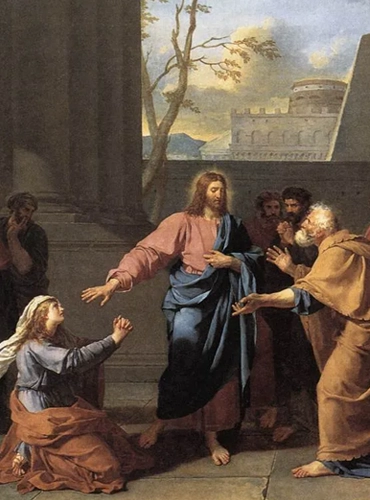Wednesday of the 18th Week of Ordinary Time – Mt 15: 21-28
As we make our way through the dog days of summer, we’re presented with some dog references in the liturgy. In today’s Gospel, Matthew recalls for us the exchange between Christ and the Canaanite woman from the region of Tyre and Sidon, and how the woman received what she asked for because of her faith and perseverance.
The woman was a Gentile, and during Jesus’s days the tension between the two groups was high, given that the Jews had suffered so much at the hands of their Gentile captors. To call them “dogs” wasn’t an uncommon insult, since the Gentiles were unclean and prone to idolatry. Yet, Jesus’s use of the term is highly nuanced: a better translation would be “puppies,” or “house or pet dogs,” which explains better the exchange between Jesus and woman. It’s not right to give what is for the little children of Israel, namely, salvation, and give it to the little children of the dogs.
In the original Greek, the woman gives an affirmative reply, saying, “Yes, Lord, but even the dogs eat the scraps that fall from the tables of their masters.” As one Christian writer explains it, it is as if the woman says, “I know, Lord, that the Gentile people are dogs in worshipping idols and barking at God. Yet even the little dogs eat the crumbs. In other words, you came to the Jews and manifested yourself to them, and they didn’t want you to make exceptions. What they rejected, give to us who are asking for it. . . . Faith accepts what work does not merit, and through faith the Gentiles were made children out of dogs.”
This has two practical consequences in our lives: first, the need for humility, and secondly, the need for faith. Saint John Chrysostom points out that Jesus calls the Jews children, but the woman goes even further, and calls them “masters.” He uses the word “dog” to describe her and her people, but she condescends to apply to herself the action of a dog, sitting under the table. She becomes a child because she lowers herself. The degree to which we will be exalted is the degree to which we lower ourselves, and this is particularly true of priests. As one founder remarked, “You will be good fathers in the measure that you are good sons.” We can ask ourselves if we really accept our limitations and failings in humility, all of which make us little better than dogs in God’s sight.
Secondly, an important element is, of course, the woman’s faith. Christ’s delay in replying was her opportunity to show an even greater faith. “The Lord does not delay his promise,” writes Saint Peter, “as some regard ‘delay,’ but he is patient with you, not wishing that any should perish but that all should come to repentance.” We must always grow in our trust in God. In one of his letters, Saint John Bosco wrote: “If I had had a hundred times more faith than I do, I would’ve done a hundred times more than I did.” “If I had had more faith, I would’ve done even more.” And this from a saint who spiritually directed many other saints, who built beautiful churches, was a gifted confessor, and saved thousands upon thousands of souls.
As the hymn Ecce panis angelorum reminds us, the Eucharist is Vere panis filiorum, Non mittendus canibus, the true bread of children, not to be thrown to the dogs. Let us pray, through the intercession of Mary, Mother of Faith, for the grace to grow humility and thus to grow in our faith in God and in His mighty power.






